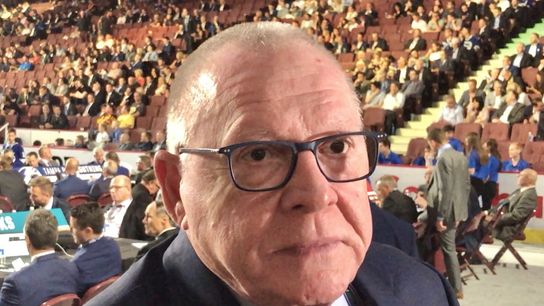The Penguins got more than Alex Galchenyuk and Pierre-Olivier Joseph when they traded Phil Kessel to Arizona Saturday.
In the process, they picked up salary-cap space that will allow Jim Rutherford to be more than an interested onlooker when the NHL's free-agent signing period begins at noon Monday.
Oh, Rutherford won't be bidding for big-ticket guys like Artemi Panarin and Matt Duchene, but he will at least be able to make a legitimate attempt to plug what he views as a significant hole in his roster.
"I just know that we're in a position that we can be active, and we wouldn't have been, otherwise," he told DKPittsburghSports.com Sunday. "We'll look for a forward. I'd like to get more balance throughout our forward lines, back to where we were in (2016) and (2017), where we're getting contributions from all lines. A guy we can put in there that we feel makes it harder for us to play against. That's another thing Mike Sullivan talks about: 'Let's be harder to play against, five-on-five.' We know what we're capable of doing on the power play and whatnot, but you play most of the game five-on-five, especially in the playoffs."
Predictably, he did not divulge who the Penguins plan to target, and it's conceivable that their list might still be tweaked a bit before the day is over.
"We have our final meeting tonight," Rutherford said. "We all get together and have dinner. We do it every year. We'll finalize exactly what we're doing and be ready to go at noon."
Precisely how much money Rutherford will have -- and, more important, will be willing -- to spend then isn't clear.
The Penguins are a little more than $5 million below the $81.5 salary-cap ceiling after the Kessel trade, but still have to re-sign restricted free agents Zach Aston-Reese, Teddy Blueger and Marcus Pettersson.
On the other hand, they already have eight defensemen under contract, so one or two of those guys presumably will be playing in Wilkes-Barre/Scranton or for another organization when the season begins, which will lower the payroll.
Paring a defenseman from the depth chart remains a priority -- Jack Johnson, who has four years remaining on a contract with an annual cap hit of $3.5 million, seems to be quite available -- but Rutherford said he won't complete any trades soon enough to have an impact on what the Penguins do in the early hours of free agency.
"Depending on what we do on Monday, there could be other options," he said. "Other changes after Monday, to change where we're at with our cap."
In other matters, Rutherford said:
• He has not had any contract discussions with Sullivan, who has one year left on his deal, but that he is not concerned that players might view Sullivan as a lame duck whose instructions are options, not orders, if he isn't re-signed before the season begins. "That would be a dangerous thing for a player to think," he said. Rutherford added that he doesn't know whether working out a new contract with Sullivan will be difficult. "He can answer that better," Rutherford said. "He loves how he's been treated by the Penguins and he loves it here in Pittsburgh. I would expect that he would like to stay here." Sullivan has been at his off-season home in Massachusetts and unavailable for comment.
• Veteran center Matt Cullen still hasn't informed the organization of his plans for next season, although "we'll know (his plans) here in the next few days." Even if Cullen retires, as expected, he won't necessarily be cutting his ties to the Penguins. Rutherford said he "most definitely" would be interested in having Cullen, a member of all three Stanley Cup-winning teams Rutherford has overseen, stay with them in a non-playing capacity, such as scouting or coaching.
• No changes are planned to the Penguins' coaching staff, or to the specific duties handled by Sullivan's assistants. They are Jacques Martin, Mark Recchi, Sergei Gonchar and Mike Buckley.
• He is not surprised that the non-playoff teams in the Metropolitan Division -- Flyers, Devils, Rangers -- have moved aggressively to upgrade their rosters since the end of the season. "This is always a very strong division," Rutherford said. "You look at teams that miss the playoffs position themselves for cap space and to do certain things. Those are the teams that usually end up doing more things."

